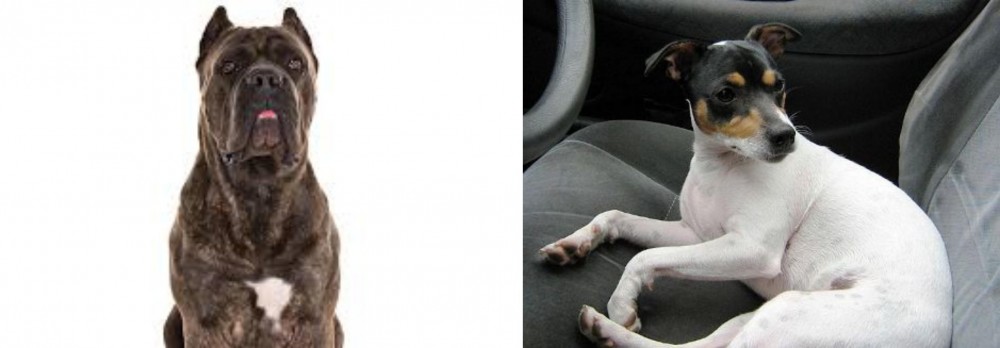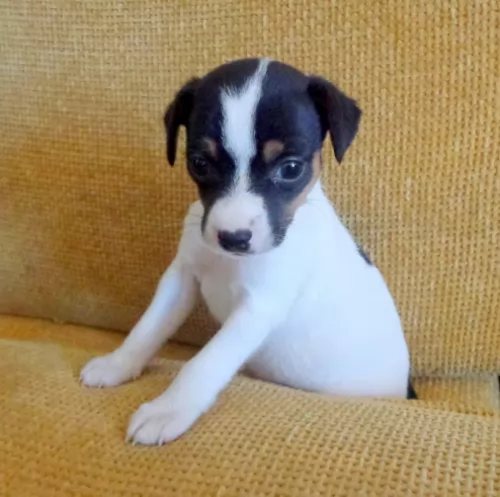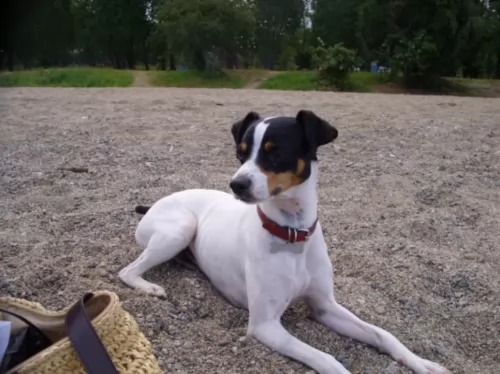 Petzlover
Petzlover Cane Corso is originated from Italy but Chilean Fox Terrier is originated from Chile. Cane Corso may grow 30 cm / 12 inches higher than Chilean Fox Terrier. Cane Corso may weigh 41 kg / 91 pounds more than Chilean Fox Terrier. Cane Corso may live 3 years less than Chilean Fox Terrier. Both Cane Corso and Chilean Fox Terrier has almost same litter size. Cane Corso requires Moderate Maintenance. But Chilean Fox Terrier requires Low Maintenance
Cane Corso is originated from Italy but Chilean Fox Terrier is originated from Chile. Cane Corso may grow 30 cm / 12 inches higher than Chilean Fox Terrier. Cane Corso may weigh 41 kg / 91 pounds more than Chilean Fox Terrier. Cane Corso may live 3 years less than Chilean Fox Terrier. Both Cane Corso and Chilean Fox Terrier has almost same litter size. Cane Corso requires Moderate Maintenance. But Chilean Fox Terrier requires Low Maintenance
 As a descendant of the Canis pugnax, the Cane Corso dog which hails from Italy has been used for guarding livestock and property. The Corso’s lineage goes far back to ancient Roman times, with the name of dog actually meaning bodyguard dog.
As a descendant of the Canis pugnax, the Cane Corso dog which hails from Italy has been used for guarding livestock and property. The Corso’s lineage goes far back to ancient Roman times, with the name of dog actually meaning bodyguard dog.
As life changed in Italy, the Corso became more rare so that some enthusiasts of the breed began to look at helping the dog recover from the brink of extinction. By 1994, the breed was accepted by the Italian Kennel Club and the dog was also recognized internationally, with the American Kennel Club recognizing the Cane Corso in 2010.
 The Chilean Fox Terrier, developed in Chile, is a dog breed which comes from crossing the British Fox Terrier with some of the local Chilean dogs.
The Chilean Fox Terrier, developed in Chile, is a dog breed which comes from crossing the British Fox Terrier with some of the local Chilean dogs.
The dog is thought to have been developed in the 19th century already, some time between 1790 and 1850.
The dog is known for its skills in catching rats and mice. Known also as the Chilean Rat Terrier, Terrier Chileno or Ratonero, the Chilean Fox Terrier hasn’t achieved formal recognition with any of the leading canine organizations.
 The Cane Corso is a large dog which hails from Italy. He is a molosser. The dog is muscled and is somewhat less bulkier than other Mastiff breeds. He is 64-70 cm in height and he weighs 45-50 kg.
The Cane Corso is a large dog which hails from Italy. He is a molosser. The dog is muscled and is somewhat less bulkier than other Mastiff breeds. He is 64-70 cm in height and he weighs 45-50 kg.
The head of the Cane Corso is large and the ears are cropped and stand erect. The tail is also traditionally docked to give the dog a distinctive look, but these days, with regulations regarding tail docking, the dog can also be seen with a full tail.
The Corso has a short coat which comes in fawn shades, gray, red, brindle or black shades. White markings are common on the chest, chin, toes and sometimes on the nose.
The Corso is a working dog who needs lots of mental and physical stimulation. He’s an inquisitive dog who is confident and ready to meet life as it comes. He’ll want a strong, firm owner with leadership qualities. He'll require training and socialization and then he becomes an affectionate, obedient pet who gets on well with all members of the family as well as other pets. He is a highly intelligent dog and responds well to training.
 The Chilean Fox Terrier looks almost identical to his ancestors. He stands between 30 – 40cm and weighs between 5 to 9kg.
The Chilean Fox Terrier looks almost identical to his ancestors. He stands between 30 – 40cm and weighs between 5 to 9kg.
He is squarely proportioned, he is athletic looking and well muscled with long, slender legs. Many of these dogs are born with naturally short tails, but if not, then the tail is usually docked after the first or second vertebrae. Now that docking is falling out of favor, the breed is losing that distinctive look.
The head of the Chilean Fox Terrier is triangular with the muzzle being somewhat shorter than the Smooth Fox Terrier. The ears of the Chilean Fox Terrier are smallish and high set, being partially erect. The coat of the dog is short and thick and essentially white while the face is usually tan and black.
The Chilean Fox Terrier is loyal with his human family and can fit in well with a family where there are children and other pets.
Training and socialization become necessary for the dog so that he becomes obedient and amicable around his family and with strangers. He isn’t an aggressive dog but he is alert and can make an excellent watch dog.
He is dominant and confident and also intelligent and easily trainable. He is an active dog so he will require exercise every day, whether he lives in the city or in the country.
 The Cane Corso is known for his agility and athleticism. He is full of energy and he also wants lots of attention and companionship from his human family. With proper training and socialization his temperament changes so that he becomes a super friend and companion while also being protective.
The Cane Corso is known for his agility and athleticism. He is full of energy and he also wants lots of attention and companionship from his human family. With proper training and socialization his temperament changes so that he becomes a super friend and companion while also being protective.
The dog is attentive and receptive to training. The way a dog turns out is essentially what the owners are like, and many Cane Corso dogs have been blamed for being aggressive because they’ve been brought up by aggressive, abusive and irresponsible owners.
The Cane Corso is a large dog with an exuberant nature and who expresses his joy by snorting, wheezing, grunting and slobbering. Treat him well as a family member and you’re going to have a wonderful friend and protector.
 The Chilean Fox Terrier is a lively dog with an alert expression. He has become a popular companion dog, being less aggressive than other Terriers.
The Chilean Fox Terrier is a lively dog with an alert expression. He has become a popular companion dog, being less aggressive than other Terriers.
When you treat him well he becomes a loyal friend and forms a strong bond with his human owners. He gets on well with children who have been taught to respect animals, but he tends to become a bit aggressive around other dogs of the same sex.
Socialization and training however can make him much more relaxed around other dogs.
He is an attractive little dog with his short coat, giving the appearance of being well groomed. He can adapt to country- or city life too. He is such an easy dog to keep too so why not choose him as your 4-legged family member? He promises to make the perfect family companion.
 The life expectancy of the Cane Corso is 10 to 12 years. He is a large, healthy dog breed, but all large dogs are inclined towards bone and joint problems which includes hip dysplasia. Your Cane Corso is also prone to eye defects.
The life expectancy of the Cane Corso is 10 to 12 years. He is a large, healthy dog breed, but all large dogs are inclined towards bone and joint problems which includes hip dysplasia. Your Cane Corso is also prone to eye defects.
Strangely, dogs have 3 eyelids, with the third eyelid being home to tear producing gland. There are some dogs where the ligament fails so that the gland pops out, looking like a cherry stuck at the inner corner of the eye. The veterinarian will be able to perform surgery to attach the gland back.
There are dogs where the eyelids roll inwards. Entropion causes hair to rub on the surface of the eye, resulting in pain and also damage to the cornea. Sometimes surgery will be necessary to fix the eyelid.
 The Chilean Fox Terrier is a healthy breed who doesn’t appear to have any particular health issues. It doesn’t mean that your dog will be free from disease, but it is worth knowing that a quality diet, fresh water and lots of love and attention does enhance longevity in a pet.
The Chilean Fox Terrier is a healthy breed who doesn’t appear to have any particular health issues. It doesn’t mean that your dog will be free from disease, but it is worth knowing that a quality diet, fresh water and lots of love and attention does enhance longevity in a pet.
It is to your benefit to know about one or two common diseases that your dog could get.
You’ll notice your pet’s stomach being swollen. Bloat is a disease which can become dangerous because the stomach can twist. Once this happens, gas can’t escape from the stomach and your pet will want to vomit, he’ll salivate and you’ll notice unusual restless kind of behavior. You need to get him to the vet as soon as possible.
This is also a disease that any dog can develop and can be a complication of another pet disease such as Lyme disease. One of the first signs of kidney disease in dogs is drinking more often than usual and also urinating more often.
He’ll lose his appetite and be lethargic and likely lose weight. Kidney disease is a serious disease and you will need to get your pet to the vet as soon as possible.
 The short coat sheds fairly heavily twice a year. His coat will certainly need a brush twice a week but during shedding time it will be more often if you want to avoid your home being full of hair. As you brush, its the chance to check for fleas, ticks and skin infections.
The short coat sheds fairly heavily twice a year. His coat will certainly need a brush twice a week but during shedding time it will be more often if you want to avoid your home being full of hair. As you brush, its the chance to check for fleas, ticks and skin infections.
Brush your Cane Corso’s teeth at least 2 or 3 times a week to remove tartar build-up. If you don’t there is the problem of bacteria which can result in gum disease, bad breath and tooth loss.
Your Cane Corso is a large, active dog and will therefore require a high quality food for his breed type. The type of food your dog eats will depend on his age and his activity levels.
The quality of dog food is highly important as it is a contributing factor towards his health. Always try to give your dog some home-made food such as vegetables, rice and meat. Include some raw meat into his diet from time to time as a dog is a carnivore, and raw meat in his diet will help to stave off skin problems. Never forget to check that he has fresh, cool water around the clock.
 The Chilean Fox Terrier is a low maintenance breed and this means you won’t be having to part with any money on grooming sessions for him. He’ll basically require a brushing twice a week.
The Chilean Fox Terrier is a low maintenance breed and this means you won’t be having to part with any money on grooming sessions for him. He’ll basically require a brushing twice a week.
The Chilean Fox Terrier, as a smaller dog breed, will also require regular dental brushing, as neglecting this can result in dental problems as well as a host of diseases that are associated with gum disease and tooth decay.
Make sure to feed him a quality diet full of vitamins and minerals and ensure he always has fresh, cool water available.